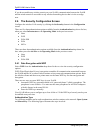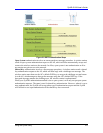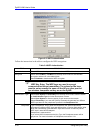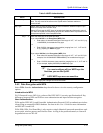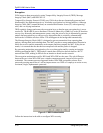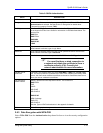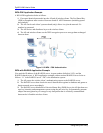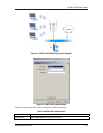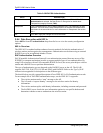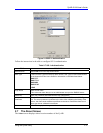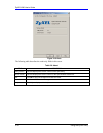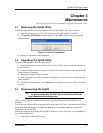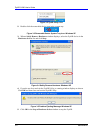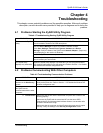
ZyAIR G-200 User’s Guide
2-16 Using the ZyAIR Utility
Table 2-6 WPA-PSK Authentication
FIELD DESCRIPTION
Encryption Status
All unicast traffic is automatically encrypted by TKIP when WPA or WPA-PSK
Authentication is selected. See the section on Encryption for details about
Temporal Key Integrity Protocol (TKIP).
Passphrase Type a Passphrase from 8 to 63 ASCII characters long. The Passphrase is case-
sensitive. You must use the same Passphrase for all wireless LAN adapters with
this feature in the same WLAN. For more information on Passphrase, see section
2.6.1.
OK
Click OK to apply the changes and close the screen.
2.6.4 Data Encryption with 802.1x
Select 802.1x from the Authentication drop-down list box to view the security configuration
options.
802.1x Overview
The IEEE 802.1x standard outlines enhanced security methods for both the authentication of
wireless stations and encryption key management. Authentication can be done using an external
RADIUS server for an unlimited number of users.
EAP Authentication Overview
EAP (Extensible Authentication Protocol) is an authentication protocol that runs on top of the
IEEE802.1x transport mechanism in order to support multiple types of user authentication. By
using EAP to interact with an EAP-compatible RADIUS server, the access point helps a wireless
station and a RADIUS server perform authentication.
The type of authentication you use depends on the RADIUS server or the AP. The ZyAIR
supports EAP-TLS, EAP-TTLS, LEAP and PEAP with RADIUS. Refer to the Types of EAP
Authentication appendix for descriptions on the different types.
The details below provide a general description of how IEEE 802.1x EAP authentication works.
For an example list of EAP-MD5 authentication steps, see the IEEE 802.1x appendix.
♦ The wireless station sends a “start” message to the AP.
♦ The AP sends a “request identity” message to the wireless station for identity
information.
♦ The wireless station replies with identity information, including username and password.
♦ The RADIUS server checks the user information against its user profile database and
determines whether or not to authenticate the wireless station.



